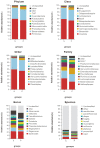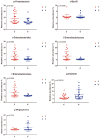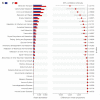Gut Microbiome Alterations and Functional Prediction in Chronic Spontaneous Urticaria Patients
- PMID: 33746191
- PMCID: PMC9723274
- DOI: 10.4014/jmb.2012.12022
Gut Microbiome Alterations and Functional Prediction in Chronic Spontaneous Urticaria Patients
Abstract
The effects of the gut microbiome on both allergy and autoimmunity in dermatological diseases have been indicated in several recent studies. Chronic spontaneous urticaria (CSU) is a disease involving allergy and autoimmunity, and there is no report detailing the role of microbiota alterations in its development. This study was performed to identify the fecal microbial composition of CSU patients and investigate the different compositions and potential genetic functions on the fecal microbiota between CSU patients and normal controls. The gut microbiota of CSU patients and healthy individuals were obtained by 16s rRNA massive sequencing. Gut microbiota diversity and composition were compared, and bioinformatics analysis of the differences was performed. The gut microbiota composition results showed that Firmicutes, Bacteroidetes, Proteobacteria, and Verrucomicrobia were dominant microbiota in CSU patients. The differential analysis showed that relative abundance of the Proteobacteria (p = 0.03), Bacilli (p = 0.04), Enterobacterales (p = 0.03), Enterobacteriaceae (p = 0.03) was significantly increased in CSU patients. In contrast, the relative abundance of Megamonas, Megasphaera, and Dialister (all p < 0.05) in these patients significantly decreased compared with healthy controls. The different microbiological compositions impacted normal gastrointestinal functions based on function prediction, resulting in abnormal pathways, including transport and metabolism. We found CSU patients exhibited gut microbiota dysbiosis compared with healthy controls. Our results indicated CSU is associated with gut microbiota dysbiosis and pointed out that the bacterial taxa increased in CSU patients, which might be involved in the pathogenesis of CSU. These results provided clues for future microbial-based therapies on CSU.
Keywords: Gut microbiome; bacterial diversity; dysbiosis; urticaria.
Conflict of interest statement
The authors have no financial conflicts of interest to declare.
Figures





References
-
- The definition, diagnostic testing, and management of chronic inducible urticarias - The EAACI/GA2LEN/EDF/ UNEV consensus recommendations 2016 update and revision - PubMed
MeSH terms
Substances
LinkOut - more resources
Full Text Sources
Other Literature Sources

